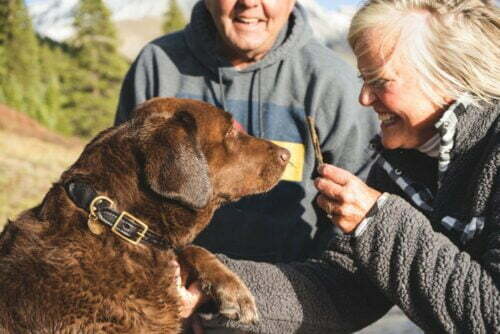Facts like these fascinate and excite me. Dogs never cease to amaze us. As well as being man's best friend, dogs help us on countless occasions. One of them is to detect those infected with Covid-19. They are also the most effective and quickest detectors of the virus.
En lo que se refiere a temas de rastreo y detección, conocemos a los perros detectores de drogas, de explosivos, de personas y de enfermedades. Enfermedades como la diabetes, la malaria, el cáncer, el Parkinson, y ahora también el Covid-19 son fácilmente detectables gracias al olfato canino.
Los perros son capaces de detectar los olores asociados a las infecciones respiratorias, siendo además, los detectores más eficaces y rápidos del COVID-19.
Ongoing investigations with detector dogs
Thanks to a project of Finnish origin, a pilot study at the University of Helsinki, dogs already trained in disease diagnosis were taught to recognise urine samples from patients infected with Covid-19. Thanks to their incredible sense of smell, they detected Covid-19 much faster than any PCR.
Apart from the Finnish study, there are also studies in the UK, France and Germany in which sniffer dogs have been trained to detect Covid-19 since last year. According to Luca Barret of the German Canine Assistance Centre:
Dogs can detect breast cancer with a 93% probability and lung cancer with a 97% probability". The success rate, which was not so good in the early days of training, has increased enormously in recent years.
Luca Barret
Perros detectores en Francia
Dogs can also identify skin, colon, ovarian and prostate cancer very reliably, says Barret. In addition, it is estimated that each dog can scan 250 people per hour, thus avoiding the use of cumbersome swabs.
Chile is a pioneer in the Americas as, together with the United Arab Emirates, they started using their trained dogs since June last year to detect Covid-19 at their airports in a rapid and non-invasive way. This is because the dogs are able to detect a characteristic odour given off by the sweat of infected people.
Perros detectores en Chile
Perros detectores en Reino Unido
Recientemente, el gobierno del Reino Unido ha comenzado unos ensayos con perros para detectar si las personas tienen el Covid-19- incluso antes de mostrar síntomas. Pretenden utilizar a los perros como medida no invasiva de detección del coronavirus.
Estos ensayos están a cargo de la Escuela de Higiene y Medicina Tropical de Londres (LSHTM), la Universidad de Durham y la organización benéfica Medical Detection Dogs. Si quieres saber más, aquí te dejo el enlace del ensayo: https://www.lshtm.ac.uk/media/49791
Seis labradores y un cocker spaniel comenzaron el entrenamiento básico para la prueba y ya hay resultados de la primera fase (mi Nala es un cruce de ambos) :
- A total of 3921 adults were enrolled in the study and odour samples were collected from 1097 SARS-CoV-2 infected and 2031 uninfected individuals.
- Six dogs were able to distinguish between samples with sensitivity ranging from 82% (95% CI 76-87) to 94% (95% CI 89-98) and specificity ranging from 76% (95% CI 70-82) to 92% (95% CI 88-96).
- Mathematical modelling suggests that screening with dogs plus a confirmatory PCR test could detect up to 91% of SARS-CoV-2 infections, greatly preventing transmission compared to isolation of symptomatic individuals alone. https://www.lshtm.ac.uk/media/49791
¿Por qué son los detectores más eficaces y rápidos del Covid-19?
Los humanos tienen alrededor de 5 millones de células olfativas, en comparación con los 125 millones de los perros «salchicha» y los 220 millones del pastor alemán. Estas células olfativas pueden llegar hasta los 300 millones en algunos perros.
Dogs also inhale up to 300 times per minute in short breaths, which means that their olfactory cells constantly receive new odour particles. In addition, dogs' noses differentiate between right and left. This spatial sense of smell allows the animals to follow a scent more easily.
During training sessions, each dog is trained to detect a specific scent: the smell of a drug, an explosive or, as here, the scent of a specific disease. This means that a dog cannot recognise several types of cancer.
Once they identify the scent, the dogs hear a click and receive a treat as a reward.
Los perros no sólo pueden intervenir en los aeropuertos para detectar enfermos de Covid-19, también pueden intervenir par aprevenir el contagio. ¿Cómo? Detectando el virus en las superficies, en los locales y transportes. Las aplicaciones son infinitas. De este modo, los perros se convierten una vez más en nuestro superhéroes y en lo los detectores más eficaces y rápidos del Covid-19.
Los perros no son inmunes al virus
A team of researchers from the UK, France and Italy have published in a journal specialising in the dissemination of preliminary data from biology studies. bioRxiv (versión on line dated 18 March). The study shows the first results on cases of the British variant of Covid-19 in cats and dogs, and the incidence of myocarditis (inflammation of the heart muscle) in these animals.
En este estudio, se informa de los primeros casos de infección de perros y gatos domésticos por la variante británica B.1.1.7 del SARS-CoV-2. Además, la mayoría de los guías habían desarrollado previamente síntomas respiratorios y también habían dado positivo en la prueba de PCR. Curiosamente, todas estas mascotas infectadas desarrollaron manifestaciones clínicas atípicas, como graves anomalías cardíacas secundarias a la miocarditis, y un profundo deterioro del estado de salud general, pero sin ningún signo respiratorio primario.
En conjunto, los hallazgos demuestran por primera vez la capacidad de los animales de compañía de ser infectados por la variante B.1.1.7 del SARS-CoV-2 y plantean preguntas sobre su patogenicidad, y en que medida pueden o no contribuir en los brotes.
Conclusion
El trabajo de detección puede ser uno de los trabajos más satisfactorios que realicemos con nuestro perro y existen modalidades para todos los gustos.
Ya seas un adiestrador profesional o un aficionado que está enseñando a su perro a encontrar las llaves, aquí te dejo unos libros de venta en Amazon que pueden servirte como manual de iniciación.
Ofrecen nociones básicas y sencillas para ir aprendiendo paso a paso. Si te fascinan tanto como a mí estos temas, estos libros son un excelente recurso del que no podrás prescindir.



